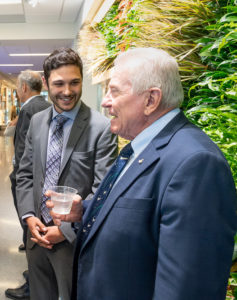
When Ben Fixman was a high school student in Seattle, he became fascinated with books about brain cancer and neurosurgery. A few years later, as a Colorado State University sophomore majoring in neuroscience, he was diagnosed with a brain tumor.
“It was completely out of the blue and strangely ironic given that I was a neuroscience student and had already started reading books about it in high school,” Fixman said. “It ended up being benign, but that experience really pushed me toward the career in medicine and research that I’m pursuing now.”
Fixman was one of 50 students in the nation, and the first from CSU, to receive the prestigious astronaut scholarship from the Astronaut Scholarship Foundation. Awarded to undergraduate students conducting research in science, technology, engineering or mathematics, the scholarship includes $10,000, a trip to Washington D.C. to attend a weekend of events, and a lifelong partnership with a mentor in their chosen field. The foundation was started in 1984 by six surviving members of Project Mercury, the first crewed spaceflight program in the United States, and is partially supported by astronauts from the Mercury, Gemini, Apollo, Skylab, Space Shuttle, and Space Station programs.
CSU joins 35 of the nation’s top research universities, including Georgia Tech and MIT, in awarding these scholarships on annual basis going forward. “This is a very prestigious program and we’re excited that CSU is now part of it,” said Mark Stetter, dean of the College of Veterinary Medicine and Biomedical Sciences.

Astronaut Loren Shriver, a Space Shuttle commander who participated in three space missions, logging more than 386 hours in space, joined the foundation on campus Sept. 27 for a special event honoring Fixman. Shriver spoke about his journey from a modest rural Iowa farm upbringing to an eventual career as an astronaut. Students took the opportunity to ask him about the views from space, life without gravity, and what it takes to join a space mission.
“Find your passion and go for it,” Shriver said. “Don’t ever let anyone tell you that you don’t have the right background for something you want to do. If you set your mind to it, you can make it happen.”
Propelled toward a meaningful career
Fixman will graduate next spring from the Molecular, Cellular, and Integrative Neuroscience program’s undergraduate degree program in neuroscience, a special academic unit jointly developed and administered by the College of Veterinary Medicine and Biomedical Sciences and the College of Natural Sciences. He’s using the scholarship to help pay tuition and medical school application fees.
“The Astronaut Scholarship Committee could not have made a better choice,” said Phillip Quirk, director of the undergraduate neuroscience program. “Ben is not only an outstanding student and a promising researcher, but his commitment to excellence extends to all aspects of his academic and personal life. He holds himself to a very high standard and his infectious enthusiasm encourages his peers to do their best as well.”

An Honors Undergraduate Research Scholar, Fixman began conducting Alzheimer’s disease and stroke research in biochemistry and molecular biology professor James Bamburg’s lab as a first-year student, where he developed a novel hippocampal slice culture and imaging method. “This was a major advance and he was first author on a paper published on it in 2017,” Bamburg said. “He has continued work on applying this culture system to studying changes in neurons following hypoxia, a model for stroke.”
Fixman was honored to receive the scholarship and felt he was doing so on behalf of the incredible team of people he has worked with throughout his undergraduate experience. “It’s amazing to have won this award, but it’s really more a representation of the work that all of my mentors, teachers and fellow undergraduates have put in as well,” Fixman said. “Everyone in the lab has been so supportive and we all work together to come up with new ideas and to devise better experiments.”
After graduation, Fixman hopes to begin a MD-PhD program in order to eventually become a physician researcher. The experience of having undergone brain surgery himself allowed him the invaluable experience of meeting and job shadowing brain surgeons. They even let him keep a slice of the removed tumor, which he named “Douglas.” Fixman now envisions a career that would allow him to work with brain cancer patients while also conducting research to better understand brain tumors. “Serving both of those roles would be very satisfying,” Fixman said. “I was lucky that my brain tumor was benign, but often times they aren’t and many are incurable. I want to work toward finding new cures.”
An Astronaut Scholarship Foundation information session will be held on Oct. 10 at 5 p.m. in the Lory Student Center, room 310. For more information about the Astronaut Scholarship Foundation award, including nomination and submission guidelines, contact Lisa Dysleski, associate dean for undergraduate programs in the College of Natural Sciences.